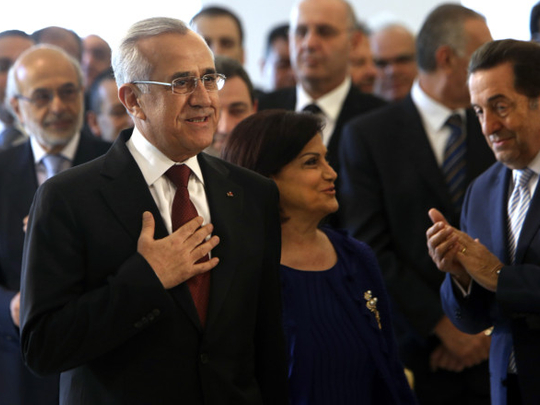
Beirut: Amid Reports that the Free Patriotic Movement (FPM) leader General Michel Aoun met with Nader Hariri, a key adviser to the Future Movement, to present an offer to extend the tenure of outgoing President Michel Sulaiman, the head-of-state delivered a farewell address to the nation that emphasized security and stability.
Boycotted by Aoun, Hezbollah, as well as Speaker Nabih Berri Sulaiman addressed an estimated 450 members of the country’s political establishment, including the current prime minister and his government, along with former President Amin Gemayel. Observers noted that President Emile Lahoud, Sulaiman’s predecessor whose term also ended in a presidential vacuum, was absent from the ceremonies too.
In the event, the president devoted most of his short speech to the constitution, acknowledging that the document was marred with flaws that obstructed the system and that these should be reformed without threatening the Ta’if Accords. This aspect of his remarks emphasized the importance of the State as the sole and legitimate institution that ought to determine the destiny of Lebanon, which was an indirect slap to Hezbollah, since that party’s senior leaders reject Ta’if and want, instead, a Thulathiyyah [Trisection] that would divide power into three equal parts, one for Christians, another for Sunnis and a third for Shiites.
Sulaiman launched his presentation with a widely acknowledged truism, that what united the Lebanese surpassed what divided them, and lamented that whatever rifts existed were caused by foreign interferences, which was not entirely correct. While national unity was, or at least ought to be, a priority that prevented citizens to agree on broad concerns, including not to interfere in the Syrian civil war, the reality was entirely different. In fact, the president’s repeated calls on Hezbollah to withdraw its militiamen from Syria fell on deaf ears, and although everyone recognized that internal dialogue was the only way to resolve existing dilemmas, Sulaiman could not record a victory on this front.
Still, he identified the unanimously adopted June 2012 Baabda Declaration, whose aim was to preserve Lebanon’s neutrality from regional developments. He believed this was a main accomplishment of his presidency that was welcomed by the international community because it alone guaranteed stability and dissociated Lebanon from the negative impacts caused by the Syrian conflict, and did not contradict either the 2006 UN Security Council Resolution 1701, which specifically called for the “full implementation of the relevant provisions of the Ta’if Accords as well as resolutions 1559 (2004) and 1680 (2006) that required the disarmament of all armed groups in Lebanon.” Sulaiman referred to 1701 several times in his farewell address, ostensibly to hammer the point that there ought to be no weapons or independent authority in Lebanon other than that of the Lebanese state. He also took credit for funding Beirut’s share of the Special Tribunal for Lebanon that sought the truth in the assassination of former Prime Minister Rafik Hariri.
Peppered with various other acknowledgements, including the special role played by the Lebanese Armed Forces (LAF) and Internal Security Forces that recorded significant accomplishments against terrorists, especially in the latter’s efforts to bust dormant cells and several spies who worked for Syria and Israel, Sulaiman thanked the Kingdom of Saudi Arabia for the exceptional $3 billion grant to the LAF, which he deemed a “historical opportunity to build a capable state.”
He closed his remarks with a plea to parliament to elect his successor, adopt a new electoral law to hold legislative elections next November — and thus prevent yet another extension — and made several suggestions to restore presidential prerogatives, including the right to form a new cabinet and sign government decrees. As a final act of mercy, he signed a decree that allowed parliament to hold an extraordinary session to deal with pending legislation, without negating the constitutionally imposed duty not to legislate before choosing a new head of state.












